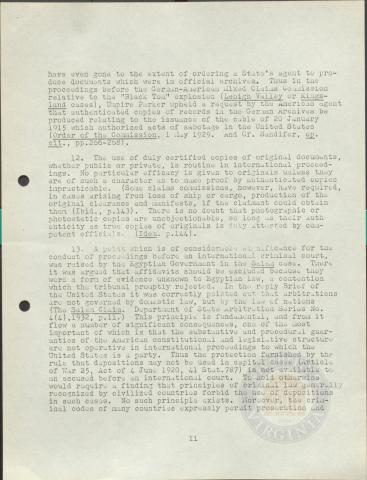
Page 11
| Parent | Perpetuation of testimony by Witnesses in U. S. for Presentation to International Military Tribunal |
|---|---|
| Date | 18 June 1945 |
| Language | English |
| Collection | Tavenner Papers & IMTFE Official Records |
| Box | Box 1 |
| Folder | General Reports and Memoranda from January 1946 |
| Repository | University of Virginia Law Library |
have even gone to the extent of ordering a State's agent to pro-duce documents which were in official archives. Thus in tne proceedings before the German-Ameriean Mixed Claims Commission relative to the "Black Tom" explosion (Lehigh Valley or Kings-land cases), Umpire Parker upheld a request by the American agent that authenticated copies of records in the German Archives be produced relating to the issuance of the cable of 20 January 1915 which authorized acts of sabotage in the United States (Order of the Commission, 1 may 1929. And Cf. Sandifer, op. cit., pp.266-266).
12. The use of duly certified copies of original documents, whether public or private, is routine in international proceed¬ings. No particular efficacy is given to originals unless they are of such a character as to make proof by authenticated copies impracticable. (Some claims commissions, however, have required, in cases arising from loss of ship or cargo, production of the original clearance and manifests, if the claimant could obtain them (Ibid., p.143). There is no doubt that photographic or photostatic copies are unobjectionable, so long as their authenticity as true copies of originals is duly attested by com¬petent officials, (Idem, p.144).
13. A point which is of considerable significance for the conduct of proceedings before an international criminal court, was raised by the Egyptian Government in the Salem case. There it was argued that affidavits should be excluded because they were a form of evidence unknown to Egyptian law, a contention which the tribunal promptly rejected. In the reply Brief of the United States it was correctly pointed out that arbitrations are not governed by domestic law, but by the law of nations (The Salem Claim. Department of State arbitration Series No. 4(4),1932, p.11.) This principle is fundamental, and from it flow a number of significant consequences, one of the most important of which is that the substantive and procedural guar¬anties of the American constitutional and legislative structure are not operative in international proceedings to which the United States is a party. Thus the protection furnished by the rule that depositions may not be used in capital cases (Article of War 25, Act of 4 June 1920, 41 Stat.787) is not available to an accused before an international court. To hold otherwise would require a finding that principles of criminal law generally recognized by civilized countries forbid the use of depositions in such cases. No such principle exists. Moreover, the crim¬inal codes of many countries expressly permit prosecution and
